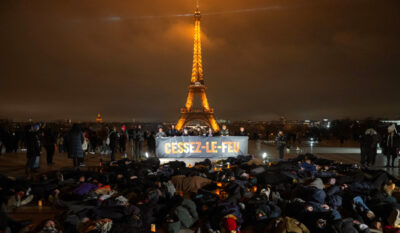Syria (2011– 2021)

“Crisis Action’s efforts to build personal connections with the independent Russian media have created invaluable partnerships based on mutual trust and respect. Their work has enabled us to humanise Russia’s involvement in Syria, allowing the Russian public to see ordinary Syrians not as abstract entities, but as living, breathing people working hard for peace and justice.” – Olga Bobrova, Journalist, Novaya Gazeta
Between 2011 and 2021, Crisis Action led a global coordinated response to the war in Syria. The war—which has led to the deaths of hundreds of thousands and forced over 13 million people to flee their homes in terror—has spurred Crisis Action to support collaborative work to push for stronger action by parties to the conflict, the UN, the Arab League and the EU to further civilian protection.
Crisis Action’s Syria strategy had two main objectives. Firstly, to prevent major escalation and ensure humanitarian needs are met in the Northwest by keeping media and political attention on the plight of civilians in Idlib. Secondly, to raise pressure for progress on the release of detainees and truth for families, with an immediate focus on the need to improve access to places of detention, access to information on the missing, and the release of all of those who are being arbitrarily detained.
Crisis Action has worked with partners to devise and deliver joint advocacy including the following:
- Ensure the passage and subsequent renewal of Resolution 2585—the UN cross-border mechanism that supports the flow of vital humanitarian assistance into the opposition-held Northwest.
- Support our partners, Families for Freedom, in briefing the UNSC, as part of one of the Council’s first ever formal events on detainees.
- Support the release of a report from the Trust and Justice Charter group of Syrian detainees and families on the need for an international mechanism for missing persons.
- Convince the US to host a UNSC briefing on the 10th anniversary of the start of the war, keeping the issue of detainees on the global agenda and helping elicit commitments from member states to tackle detention.
- Bring together 11 embassy representatives and senior UN officials for a briefing on detainees hosted by the Swedish Embassy in Beirut.
- Support Syrian partners in making compelling cases for action on detention at a UN side event we moderated, ‘’Ten Years of Conflict in Syria’’, which was attended by UN ambassadors and officials.
- Support the makers of the Oscar-shortlisted documentary, For Sama, in speaking out about the situation in Idlib via an op-ed in The New York Times, an appeal outside the UN headquarters in New York for an end to the targeting of hospitals, and a screening of the film in Russia.
- Help maintain global media attention, diversify the array of voices commenting on the reality of life in Syria, and bring the conflict into Russian public discourage and popular culture and consciousness for the first time, by supporting rappers Amir Al-Muarri (from Idlib) and Marisol (from St Petersburg) to share hip-hop tracks criticising all belligerents targeting civilians in Syria. An audience of millions was reached via social media and coverage in outlets the world over, including Al Hurra, Al-Araby, the BBC, Der Tagespiegel, Novaya Gazeta, and many more.
- Organize a first-of-its-kind ‘Anti-war Syria Talk’ in St. Petersburg, hosted by the Soldiers’ Mothers Committee and attended by wide range of Russian activists, enabling a dialogue between civil society in the two countries. Following the meeting, a series of small demonstrations broke out in the streets of St. Petersburg, suggesting growing opposition to the official Russian narrative on Syria.
- Support Syrian and Russian civil society to jointly file a landmark legal action against a Russian private contractor for its role in the torture of a detainee in Syria. The case, described as having potentially significant implications for accountability around the future treatment of detainees in Syria and beyond, is one of the groundbreaking collaborations stemming from a Crisis Action conference bringing together 40 Syrian and Russian civil society together in 2019.
- Support work on accountability for human rights violations in Idlib. In direct response to NGO demands, the findings of a UN Board of Inquiry formed to investigate attacks on schools and hospitals in Idlib were made public. The report’s conclusion that it was ‘highly probable’ that the government of Syria and/or its allies had carried out illegal airstrikes will help ensure future accountability.


